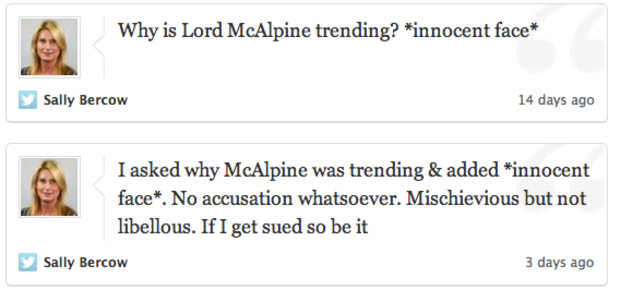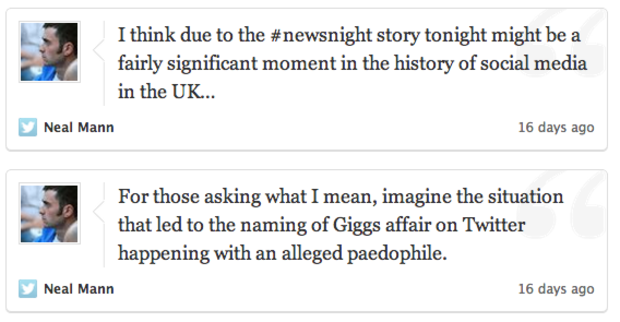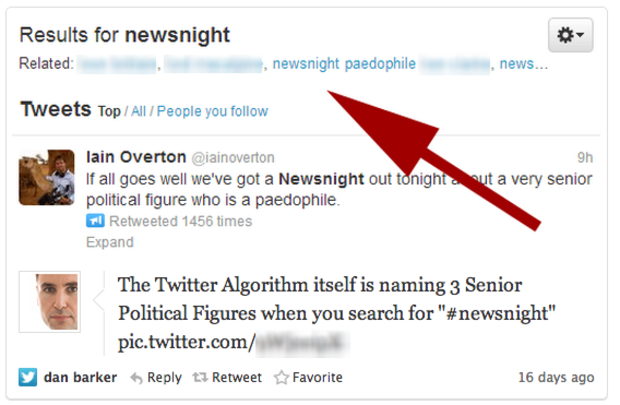BBC sex abuse scandal: Can you get sued over a tweet?
LONDONA legal brouhaha is brewing in the United Kingdom after a BBC News program led to Twitter users falsely outing of a former senior U.K. politician as a pedophile. They were wrong and now face legal action by the Conservative life peer, who currently sits in the U.K. House of Lords. Concerns have surfaced over Twitter and the delicate legal balance of free speech and defamation, raising the question: Can you get sued for a tweet?
The BBC, a cornerstone of British society, is under attack after the recent revelations over the mass alleged sexual abuse by the late Jimmy Savile while he was a BBC employee, presenter and broadcaster with the corporation. The suspected abuse came to a light almost a year after his death in a television expose by rival broadcaster, ITV.
British peer mistakenly named as "pedophile"
The BBC's flagship news analysis program, "Newsnight," had investigated the claims before the ITV documentary but was shelved after a string of editorial decisions "applied the brakes" on the broadcast, as discovered by another program by another BBC flagship series, "Panorama," the broadcaster's award-winning investigative program.
But only weeks later, "Newsnight" got it wrong again. Steve Messham, a child abuse victim during the 1970's, described how a "senior [British] politician" abused him as a child while serving under the Margaret Thatcher government. While Messham and BBC's "Newsnight" did not name the politician, hundreds of Twitter users took to the microblogging site to wrongly name Lord Alistair McAlpine as the alleged abuser.
Once McAlpine's name became public knowledge, Messham was quick to note that McAlpine was not his abuser and was quick to unreservedly apologize for the mistaken identity. However, in spite of the BBC not naming McAlpine during the "Newsnight" broadcast, the program's editors failed to contact McAlpine before the broadcast for comment or to inform him of the serious claims against him -- albeit unknowingly at the time that they were false claims -- which may have allowed him to seek legal options such as a stay or injunction on the broadcast.
As a result of the editorial failures by "Newsnight," the broadcaster's director general, George Entwistle, resigned after only 54 days in in the corporation's top job.
Ofcom, the U.K.'s communications and broadcasting regulator is now investigating the BBC over the "Newsnight" program.
Lord McAlpine, after expressing sympathy for Meesham in spite of the "public hatred" following the mistaken identity, has received £185,000 ($293,000) plus costs, in a settlement with the broadcaster.
Apologize or face court
Lord McAlpine has now launched a string of legal cases against Twitter users who tweeted, retweeted or alluded to the link between McAlpine and what he described as "wholly false and seriously defamatory" claims made on the microblogging site, said McAlpine's lawyer Andrew Reid. He said there were 1,000 "original" tweets and an additional 9,000 retweets, which could result in a legal case with the largest number of defendants in British legal history.
There is a caveat, however: The Twitter users in question will be sued only if they do not apologize, he said on the BBC's World at One radio program.
According to Reid, the "very long list" includes: "This Morning," an ITV television program in which the show's host handed a list of alleged pedophiles to British Prime Minister David Cameron on its morning show that was not shielded properly from the camera allowing many viewers to read the names; the U.K. House of Commons' speaker's wife, Sally Bercow, despite claiming her tweet was "foolish," but "not libelous"; and well-known television personality Alan Davies who asked "who the Tory paedophile [sic] is" on November 3, who then retweeted a user who named McAlpine.
They will "receive a letter before action... and they will have 48 hours to respond... the sooner this is dealt with, the better for all parties," Reid said.
George Monboit, a journalist with London-based newspaper The Guardian, has already apologized and should avoid legal action, according to Reid.
Just a handful of examples include:
Iain Overton, former editor of the Bureau of Investigative Journalism, resigned last Monday after tweeting (now deleted) before the failed "Newsnight" expose:
Sally Bercow posted two tweets, two weeks apart -- the first immediately following the controversial episode of "Newsnight" and a second tweet defending her post on Twitter.
The Wall Street Journal's social media editor Neal Mann, kept his tweet vague and may have avoided any possible libel action by not naming names or alluding to who may be involved:
But as a result to Twitter's "related tweets" regarding the "Newsnight" program, a series of senior political figures were "named" by Twitter inadvertently, thanks to the microblogging site's search algorithm. (These results were blurred before publication for legal reasons.)
Anyone who retweeted the names of the alleged abusers may have been in breach of U.K., but also U.S. law.
Defamation, libel or slander?
While many may not know the in-depths of legalities behind "slander," "libel" or "defamation of character," the majority recognize that one cannot make a statement -- whether written or verbal, broadcast or in print -- without justification or evidence, yet most likely do this on a regular basis without necessarily thinking twice about it.
Defamation laws between the U.K. and the U.S. remain similar, in spite of the freedom of speech implications. While the U.S. has the constitutionally bound First Amendment, the U.K. employs a "fair speech" legal system in its uncodified, unwritten and precedent-setting constitution. Despite the differences, the laws translate all but entirely across the Atlantic and in both directions.
Free speech is all good and well, but regardless of laws protecting the right to such freedoms, it cannot be at the expense of another person -- particularly if it is an untrue statement, whether inadvertently or with malicious intention.
The Internet and the expansion of social networks and instant communications have not changed these laws. You could falsely call someone a "liar" or a "pedophile" in the pub -- expect a punch in the face in return -- but they could instead take the matter to court and win substantial damages. Yet with the uptick in Twitter users and social media popularity, making the same allegations online can make it far easier for someone to fall foul of defamation laws.
"Defamation of character" is the umbrella term for "libel" and "slander," which can be written or spoken -- or even both -- with a statement that may force a change of opinion by someone, such as accusing them of immorality, dishonesty, or in the case of McAlpine, accusing someone of criminal wrongdoing. There must be damage to a person's reputation or character as a result of the defamation.
"Libel" is an untrue written statement that "defames" a person's reputation. This can be on a poster, a letter, an Internet forum (however, this was disputed in a U.K. High Court ruling in 2009, which ruled that defamation on a forum is closer to slander than libel), a website or even on social networking sites, such as Twitter.
U.K. libel laws are proportional, and relate directly to the damage of a person's character at the time the alleged defamation was committed.
For example, if claims were wrongly made that a legal expert broke the law, it would be considered a defamatory statement because that person's status as a legal expert would be tarnished by such allegations.
However, if a person claimed a convicted murderer had failed to pay his taxes this would not be a defamatory statement. This is due to the fact that any public opinion of him would likely not change because after all the person is a convicted killer.
Even something seemingly insignificant such as using a poorly judged adjective or descriptor -- in all seriousness -- could lead to a defamation case. If one said that a prominent politician was "seen in the company" of a prostitute, it does not mean that they necessarily "enjoyed" their services.
And, using the term "allegedly" in a statement does not indemnify any person from committing libel or slander.
Libel remains for the living and does not extend to the deceased. In the wake of the allegations against Jimmy Savile, who died last year, he has been described by police as "undoubtedly" one of the most prolific sex offenders in recent British history. He was not convicted of a sexual crime during his life, and judgments do not apply posthumously to the dead. Anyone, for that matter, could make up a statement or claim, no matter how vicious or obviously untrue, against any deceased individual under U.K. law and they have not committed a crime.
For journalists, getting something wrong may be the difference between an emailed request for a correction and an all-out lawsuit. Journalists should simply avoid making anything up, check their sources and check them again, because under U.K. law, if you make a claim, you must prove it "beyond reasonable doubt." In many cases, irregularities or inaccuracies in reporting can often be fixed with a swift phone call to the editor or the reporter and a subsequent change to the writer's copy. Libel can be anything as high-profile as calling a British life peer a "pedophile," or as low-fry as a local reporter accidentally publishing the wrong charge of an arrested person due to a simple editorial oversight.
In both instances, a defamation case could be brought against the reporter or the publication. Should that happen, anyone repeating that defamatory statement could also result in action against that person, even if it was simply hitting the "retweet" button to the news article or publication's original tweet.
To tweet or not to tweet
The same applies to ordinary people on the street, particularly in the "citizen journalism" age; tweet what you see, but be mindful of embellishing that tweet with conjecture, because you may not know the run-up to the witnessed event or the subsequent moments after.
In the U.S., the case of New York Times Co. v. Sullivan, differentiates between being "a bit mean" against a public figure in an opinion or editorial "op-ed" piece, a commentary or analysis piece, and intending to commit "actual malice" or "reckless disregard for the truth." This so-called "public figure" exception means that news publications can publish a story that is unpleasant to read for the person in question, but unless the report was published with a "reckless disregard of whether it was false or not," or with "knowledge that the information was false," it would not be defamatory.
Also, similarly to U.K. law, damages must be proven. If a public figure is proven to have suffered an "intentional infliction of emotional distress," noted under Hustler Magazine v. Falwell, a defamation case can be brought before the courts.
Regardless of where you are in the world, this digital and inter-connected age holds no bounds when it comes to the law.
Defamation between the U.K. and the U.S. are very similar, despite the legal nuances and exceptions, but does not preclude a Twitter user, for example, from facing court in another legal jurisdiction, or by that claimant bringing a case to their jurisdiction, if they state a false claim or simply retweet it.
To put it simply: don't tweet something that could be false. If in doubt, don't retweet.



